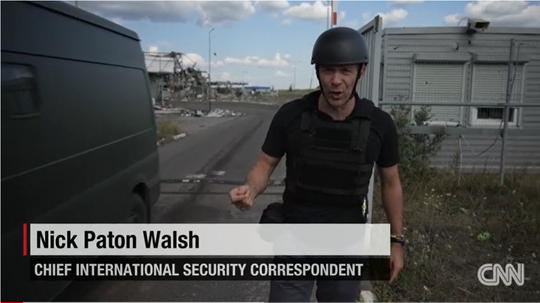On 22 August, Russia’s security services opened a criminal investigation against British reporter and CNN’s International Security Editor, Nick Paton Walsh, following a legal assessment of visual materials that allegedly prove the presence of the British reporter in Sudzha.
However, Paton Walsh is not the only foreign journalist prosecuted by Russian authorities for covering the cross-border Ukrainian offensive in Russian territory. Ukrainian correspondents Olesya Borovik, who was working for My-Ukraina television, and Diana Butsko, who was reporting for the local Hromadske news site, are also being prosecuted based on the same charges.
Five days earlier, on 17 August, the Russian News Agency TASS reported that the FSB state security service had initiated a criminal case in relation to charges of illegally crossing the border against Italian reporters Stefania Battistini and Simone Traini, who took video footage in Sudzha, the Russian region of Kursk. The Italian media crew, who were working for the public broadcaster RAI under Ukrainian military escort, were the first to report the Ukrainian offensive in the Kursk region that started on 6 August.
If found guilty, the reporters could face up to five years in prison, according to Russia’s Criminal Code. The FSB announced that prosecuted journalists will shortly be placed on an international wanted list.
The Italian public broadcaster RAI aired a TV report on 14 August showing their correspondents driving in the region accompanied by Ukrainian military. After the broadcast, threats of prosecution against the two Italian journalists flooded Russian media and prompted their media employer RAI to make the journalists “return temporarily to Italy, solely to ensure personal safety and security". Battistini and Traini arrived safely in Milan, Italy, on 18 August.
Following their return, the General Secretary of the IFJ affiliate, the Federazione Nazionale Stampa Italiana (FNSI), Alessandra Costante, said: “We wonder what the government is waiting for to show discomfort and amazement towards Putin's Russia [...] What could have an impact on this affair is to summon the Russian ambassador to formally ask for an account of the threats to the two journalists and to all Italian media."
Russia's Foreign Ministry said that it had summoned Italy's ambassador in Moscow in relation to the border crossing.
IFJ General Secretary Anthony Bellanger said: “We utterly reject the charges brought by Russian authorities against foreign journalists for simply doing their job. Bringing legal action against and prosecuting foreign journalists to intimidate and silence them shows Russia’s desperation to control the war’s narrative beyond its borders. We stand in full solidarity with prosecuted journalists and urge the Russian government to halt its tactics involving journalists for political ends.”

